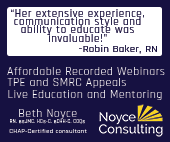by Elizabeth E. Hogue, Esq.
Treatment in Place
Providers of services to patients in their homes are anecdotally familiar with situations in which patients need help at home, but do not qualify for home health services and have not arranged for or are unable to afford home care/private duty services. These patients need assistance, but do not need transport.
The Problem
The problem for Emergency Medical Services (EMS) is nonpayment for services if patients are not transported for services.
Can EMS Charge Without Transport
The Office of Inspector General (OIG) of the U.S. Department of Health and Human Services has weighed in on whether local EMS can meet this need and bill patients’ insurance for treatment in place (TIP) services. The OIG has “blessed” the provision and billing of these services in Advisory Opinion No. 24-09 issued on November 21, 2024.

Treatment in Place Requirements to Bill Insurance
Specifically, the OIG says that EMS may provide services to patients in their homes or TIP services and bill Patients’ insurers if the following requirements are met:
- Charges to patients’ insurers would be limited for emergency responses only.
- Charges for TIP services must be based on the level of care furnished to patients and cannot exceed amounts currently claimed for payment for the same levels of care furnished in connection with ambulance transports.
- Charges are made regardless of whether patients are enrolled in commercial insurance plans or federal health programs.
- EMS accepts payment for TIP services from patients’ health insurances as payment in full.
- Patients will not be billed for any cost-sharing amounts under patients’ health insurance, including federal health care programs for covered TIP services, regardless of whether they are residents or nonresidents of the county where TIP services are provided.
- EMS cannot later claim cost-sharing amounts waived as bed debts for payments under federal health care programs or otherwise shift the burden of cost-sharing waivers onto federal health care programs, other payors, or individuals by, for example, balance billing.
Cost-Sharing
In light of the above, the OIG first acknowledged that the prohibition on waivers of cost-sharing under the federal anti-kickback statute (AKS) is applicable and that the requirements of a safe harbor that addresses waivers of cost-sharing amounts for municipally owned ambulances are not met by the proposed arrangement. The OIG also said that the proposed arrangement would result in remuneration in the form of cost-sharing waivers for TIP services and TIP services provided at no charge to patients. Consequently, remuneration provided implicates both the AKS and the Beneficiary Inducements CMP.
Risk
Nonetheless, the OIG concluded that the arrangement involves a low risk of fraud and abuse. In addition to the above requirements, the OIG concluded that neither Medicare Part B nor the State Medicaid Program currently covers TIP services; only a handful of Medicare Advantage Plans and some Medicaid Programs currently cover TIP services. This means that, in most circumstances, the arrangement will result in no costs to federal health care programs and, in fact, may reduce costs by avoiding ambulance transport or subsequent hospital care. Patients may also receive care more quickly and efficiently, and at more appropriate levels of care when they receive TIP services.
Treatment in Place Cost-sharing Waivers
Finally, according to the OIG, waivers of cost-sharing for TIP services or the provision of free TIP services are unlikely to affect patients’ decisions to use future emergency ambulance services reimbursed by federal health care programs.
Providers are increasingly aware that patients need a variety of services in their homes. The OIG has opened another door!
# # #


Elizabeth Hogue is an attorney in private practice with extensive experience in health care. She represents clients across the U.S., including professional associations, managed care providers, hospitals, long-term care facilities, home health agencies, durable medical equipment companies, and hospices.
©2025 Elizabeth E. Hogue, Esq. All rights reserved.
No portion of this material may be reproduced in any form without the advance written permission of the author.
©2025 by The Rowan Report, Peoria, AZ. All rights reserved. This article originally appeared in The Rowan Report. One copy may be printed for personal use: further reproduction by permission only. editor@therowanreport.com



